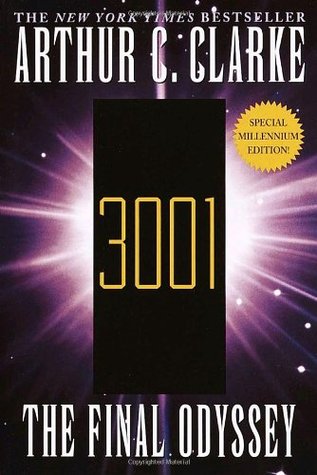3001: The Final Odyssey is the fourth and final book by Arthur C. Clarke in the tremendous epic 2001 series. Dr. Frank Poole’s freeze-dried corpse, murdered by HAL in 2001, is found floating in deep space in the Kuiper Belt. He is rescued, revived, and spends about half the novel exploring the technologies of 3001 on Earth. When he is offered the opportunity to return to Europa, he accepts eagerly, eventually reuniting with the entity formerly known as Dave Bowman as well as HAL, and together they execute a plan that will forever change their relationship with the monoliths and what they represent.
As with all three of it’s predecessors, the science in this work of science fiction is wonderful, and this novel in particular excels in both making the advanced technology seem both feasible and imaginatively inspiring. Technologies such as the braincap, space elevators, and the space drive are rooted in theories that exist today, and their descriptions within daily life brought them a little closer to reality. There were also the equivalent of holodecks and the genetically engineered dinosaur baby-sitters that lightened up with mood without feeling too silly.
Similar to 2010, I noticed several inconsistencies between the books, which does make me feel uncomfortably like someone forgot to turn off the stove before we left the house. Clarke does address this concern directly in an afterward, noting that each book has its own universe that follows the same thematic story. When he finished that thought with the quote, “It’s fiction, stupid”, I was reminded again that Clarke is first and foremost a scientist, and second a storyteller.
I have mixed feelings about the ending, but in order to avoid spoilers, I will say that, for me, I did not walk away feeling the magic and power that the other books provided, but I was instead left with a disappointment in the human race, the Firstborn race who created the monoliths, and pretty much all other sentient life. It’s possible Clarke meant to highlight the inconsistencies and faults present even in significantly advanced societies, including our own. This is a tragic, powerful, hopeless ending, and not at all what I expected.
All in all, this is a solid conclusion for 2001 series. Again, my recommendation is tailored for Clarke fans and those interested in era-specific science fiction
.
